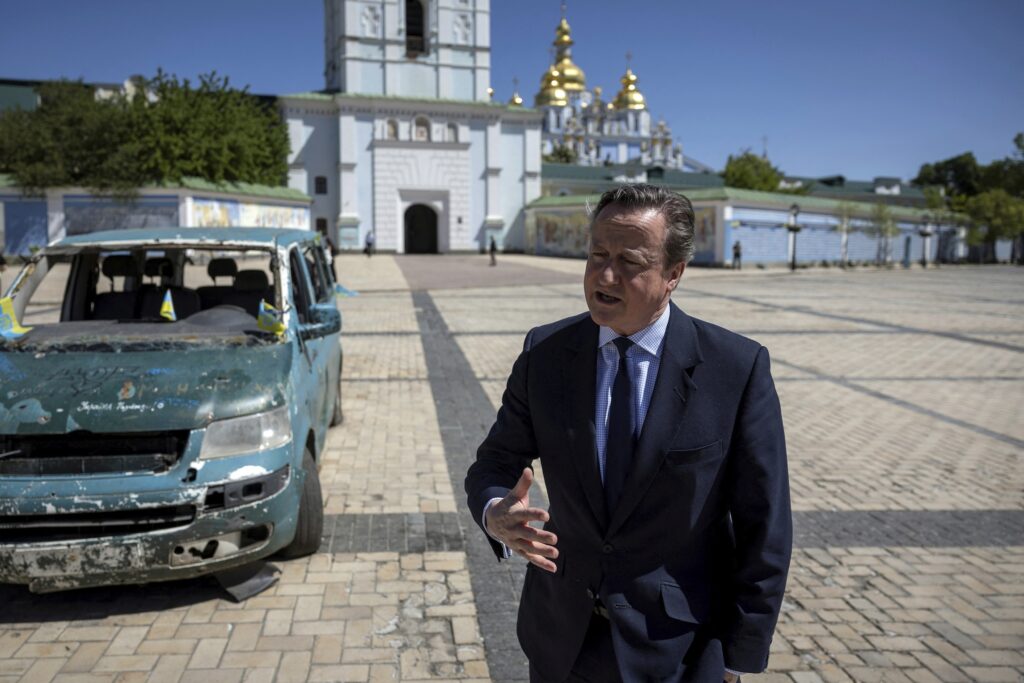
British Prime Minister Rishi Sunak will not object to Ukraine using British weapons to strike military targets inside Russia, according to the United Kingdom’s top diplomat.
“Ukraine has that right,” British Foreign Secretary David Cameron said during a visit to the war-torn country. “Just as Russia is striking inside Ukraine, you can quite understand why Ukraine feels the need to make sure it’s defending itself.”
Cameron’s allowance amounted to a “verbal escalation,” Russian President Vladimir Putin’s associates retorted.
“We see this kind of verbal escalation from officials. We see it both at the level of heads of state when it comes to France and at a rather expert level when it comes to the U.K.,” Kremlin spokesman Dmitry Peskov said, per state media. “This is a direct escalation of tensions around the Ukrainian conflict, which could potentially pose a threat to European security, for the entire European security architecture.”
The British statement suggests that London is willing to take risks that the Biden administration has been keen to avoid as Washington has restricted Ukraine’s use of U.S. weapons on Russian soil. Moscow, for their part, hastened to respond by accusing Cameron of risking a nuclear war.
“The only question is how crazy one has to be, imagining yourself, so to speak, to be one of the leaders of a supposedly civilized country, to declare such things,” Russian foreign ministry spokeswoman Maria Zakharova said. “Moreover, how much of amnesia one has suffer if they fail to remember that we are talking about nuclear countries.”
Putin has indulged in nuclear saber-rattling throughout the full-scale conflict in an apparent effort to discourage Western powers from aiding Ukraine. U.S. and European leaders gradually have defied those threats, but a protracted lapse in U.S. military assistance has spurred the U.K. and France to contemplate ways to upgrade Western support to Ukraine lest Russia salvage a victory from the debacle of Russia’s full-scale invasion in 2022.
“We will give 3 billion pounds [worth of military assistance] every year for as long as is necessary,” Cameron said. “We’ve just really emptied all we can in terms of giving equipment. Some of that [equipment] is actually arriving in Ukraine today while I’m here.”

Those deliveries and more are badly needed, notwithstanding the political agreement in Washington that authorized President Joe Biden to begin to ship more American military assistance to Ukraine. The monthslong logjam in Congress left Ukrainian forces at a severe disadvantage for lack of ammunition, and Russian forces are trying to exploit their edge before the U.S. assistance reaches the front lines in major quantities.
“Our problem is very simple: we have no weapons. They always knew April and May would be a difficult time for us,” Ukrainian Maj. Gen. Vadym Skibitsky told the Economist.
Russian forces have been pressing to conquer the parts of Donetsk that remain in Ukrainian hands in a bid to vindicate Putin’s on-paper annexation of that region in 2022. As the battlefield dynamics shifted in favor of Russian forces in recent months, Western leaders have been pressed to reconsider what they might be willing to do to shore up Ukraine, with French President Emmanuel Macron even going so far as to discuss the possibility of a military intervention to prevent a Ukrainian defeat.
“If the Russians were to break through the front lines, if there were a Ukrainian request, which is not the case today, we would legitimately have to ask ourselves this question,” Macron told the Economist. “It would be wrong in terms of credibility and deterrence vis-a-vis the Russians to rule it out. I note, by the way, that the aggressiveness of the Russian response to what I said showed that this was having the desired effect, which was to say: Don’t think that we will stop here if you don’t stop.”
CLICK HERE TO READ MORE FROM THE WASHINGTON EXAMINER
Ukrainian President Volodymyr Zelensky, for his part, acknowledged to military cadets that “we are approaching a new stage of the war” but maintained that Ukrainian forces would prove able to stem the tide.
“The occupiers are preparing to attempt to expand offensive actions. And we all together, all Ukrainians, our soldiers, our state, our allies, we must do everything in order to disrupt Russia’s plan,” he said, per a Ukrainian media translation. “We must prove that the occupiers will not manage to achieve their goals under any circumstances, no matter what they do and how vile their actions are. Ukraine will prevail anyway.”







